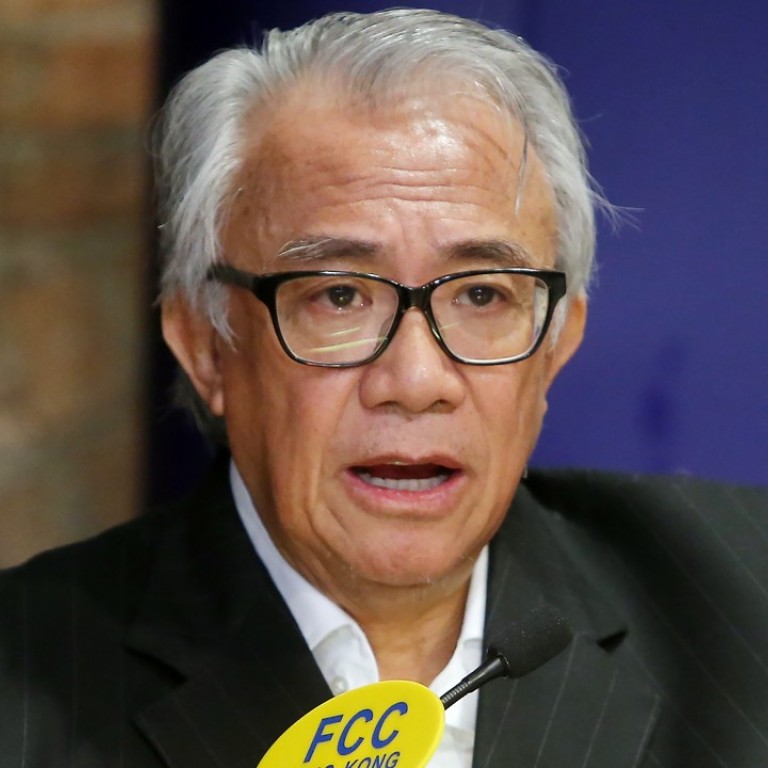
Letters to the Editor, September 8, 2017
David Tang was definitely a true Chinese
More important than his ability to entertain is that Tang was also a very kind man with a generous heart and a social conscience.
He came from a family of Hong Kong philanthropists and lived up to their history.
Although he did not endow schools and hospitals in the way that [his grandfather] Tang Shiu-kin did, he supported the arts and China’s emerging contemporary art scene.
He brought together in Hong Kong a wonderfully expert group of specialists – world leaders – in a symposium on the West Kowloon Cultural District and M+, when the government was still treating property developers as experts in the arts.
He ensured the China Club could showcase contemporary Chinese painting in a 1930s Shanghai setting to the many visiting businessmen who were entertained there, by persuading Jiang Zemin’s office to extend its lease.
Though he loved English society, Tang was proud of his roots and of being Chinese.
In a very Chinese way, not as a man “white inside”, he believed that your actions marked your righteousness.
When asked, at a charity event he was supporting, what he had done for Down’s syndrome sufferers, other than donate money, he went out and hired a sufferer for his office; who remained long employed by him.
Along with his kindness and generosity, he had learning and social concern, especially for the fate of young people in the cartel-dominated economy of Hong Kong, that marked him out as a true Chinese man of wisdom. Lo should be proud of David Tang as a true Chinese, and true friend and patriot for Hong Kong, not deny him that honour on account of his travels, or his ability to charm the likes of Princess Diana and entertain the rest of us.
Those who knew him will miss him and cherish the memory of his actions.
Paul Serfaty, Mid-Levels
Citizens need to pitch in for greener living
As Lui points out, it was reported in March that Central district had recorded “an air quality index of 190 – several times worse than in Beijing”.
Bear in mind that the capital is notorious throughout the country for its really high air pollution levels.
As chief executive, Carrie Lam Cheng Yuet-ngor should be trying to raise levels of awareness, so that Hongkongers are willing to help tackle the environmental challenges that the city faces.
We all need to make the necessary lifestyle changes, such as using public transport instead of private cars and always bringing our own reusable bags to supermarkets when we go shopping.
Hong Kong regarded as an international finance centre and popular tourist destination.
If we don’t improve air quality, we will soon start losing investors and visitors. As I say, we can’t just rely on our leaders; we all need to pitch in to make a difference.
At home, we should recycle as much waste as possible and cut back on our use of air conditioners. It is often just as comfortable with a fan, and this simple step allows us to make substantial energy savings.
Less energy use means that power stations would be burning less fossil fuel to produce it.
I hope that eventually all Hongkongers will see it as their responsibility to do their bit to save the planet.
This is our city and we must all work together to make the necessary improvements to clean it up.
Peter Tam, Po Lam
Policies must improve life for working mums
I agree with correspondents who say that working mothers in Hong Kong need a lot more help to find the right work-life balance.
Many employees in the city work long hours, and so getting that balance is very difficult.
Most women only get 10 weeks of maternity leave, compared with the International Labour Organisation’s recommendation of at least 14 weeks.
Also, a lot of workplaces lack childcare services and nursing-friendly facilities for mothers.
When these problems exist and there is a lack of flexibility, workers feel more stressed.
In developed countries such as Australia, female employees can claim up to 52 weeks of maternity leave, so clearly there is plenty of room for improvement in Hong Kong.
The government should consider stipulating longer maternity leave and ensuring that there are more breastfeeding facilities in workplaces, as well as shopping malls throughout the city.
It surely has a duty to introduce policies which will improve the lives of mothers in the workplace and give them a better chance to achieve a good work-life balance.
Leo Ho, Tseung Kwan O
Opt-out donor system could be the answer
Some correspondents have talked about the shortage of organ donors in Hong Kong and the need to lower the legal donor age from 18.
Many citizens are reluctant to register as donors because of traditional thinking about an intact body after death. The government needs to get the message across about the importance of organ donation.
It should consider changing the law to an opt-out system, so that people are automatically considered donors unless they choose not to be.
Liu Hoi-yee, Yau Yat Chuen

